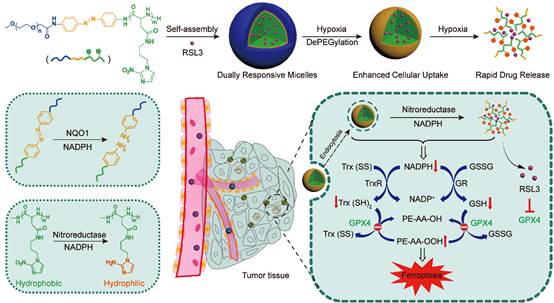Traditional cancer chemotherapy may cause problems in terms of targeting, drug resistance, side effects, metastasis and recurrence. Recently, a team led by Professor Zhao Yanjun and Prof. Wang Zheng from the School of Pharmaceutical Science and Technology has designed a novel nano drug carrier based on the mechanism of ferroptosis. This carrier, with the characteristics of selectivity and broad spectrum, is expected to effectively kill solid tumor cells, only causing normal minor injuries, which brings new hope for mankind to overcome cancers. Related research results are published on ASC Nano.
Ferroptosis is a new form of iron-dependent cell death pathway, different from other cell death pathways such as apoptosis and autophagy in morphological, biochemical and genetic features. Its specific feature is the imbalance of redox homeostasis caused by the accumulation of specific lipid peroxides. Reduced nicotinamide adenine dinucleotide phosphate (NADPH) is one of the key molecules to maintain intracellular redox homeostasis.
Researchers have found that selective consumption of NADPH in tumor cells can enhance ferroptosis of the cells.

Figure 1. ferroptosis of tumor cells sensitized by hypoxia sensitive polymer
The team led by Prof. Zhao and Wang designed a double hypoxia sensitive polymer nano micelle carrier containing azobenzene and nitroimidazole functional groups, which was loaded with small molecule ferroptosis inducer to selectively attack cancer cells. With mouse breast cancer cells as the model, the polymer carrier developed by the team can not only enhance the drug uptake of tumor cells and realize the controlled release of drugs in the cells, but also consume a large amount of NADPH in tumor cells, leading to the depletion of glutathione (GSH) and thioredoxin (TRX). It also further inhibits glutathione peroxidase 4 (GPx4) activity, thereby sensitizing tumor cells to iron death (Fig. 1). Because of the great difference of oxygen concentration between hypoxic solid tumor and normoxic normal tissue, the sensitization effect of iron death of these carriers is limited to tumor cells and has no toxicity to normal cells.
According to the researchers, this drug carrier has three advantages. The first is selectivity, as it can reduce “accidental injury” to healthy cells based on the differentiation of tumor tissue and normal organ or tissue according to hypoxia; the second one is broad spectrum, as it has curative effect on all kinds of hypoxic solid tumors; the third one is drug resistance, as it is highly sensitive to drug-resistant cells based on apoptosis mechanism.
By Cheng Sheng
Editor:Eva Yin






